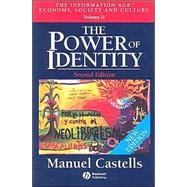
| List of Figures | x | ||||
| List of Tables | xii | ||||
| List of Charts | xiv | ||||
| Preface and Acknowledgments 2003 | xv | ||||
| Acknowledgments 1996 | xxi | ||||
| Our World, our Lives | 1 | (4) | |||
| 1 Communal Heavens: Identity and Meaning in the Network Society | 5 | (66) | |||
|
6 | (6) | |||
|
12 | (18) | |||
|
13 | (10) | |||
|
23 | (7) | |||
|
30 | (24) | |||
|
35 | (10) | |||
|
45 | (9) | |||
|
54 | (2) | |||
|
56 | (7) | |||
|
63 | (5) | |||
|
68 | (3) | |||
| 2 The Other Face of the Earth: Social Movements against the New Global Order | 71 | (97) | |||
|
72 | (3) | |||
|
75 | (12) | |||
|
77 | (3) | |||
|
80 | (2) | |||
|
82 | (3) | |||
|
85 | (2) | |||
|
87 | (13) | |||
|
90 | (5) | |||
|
95 | (3) | |||
|
98 | (1) | |||
|
99 | (1) | |||
|
100 | (8) | |||
|
101 | (3) | |||
|
104 | (1) | |||
|
105 | (3) | |||
|
108 | (37) | |||
|
111 | (4) | |||
|
115 | (4) | |||
|
119 | (5) | |||
|
124 | (4) | |||
|
128 | (7) | |||
|
135 | (5) | |||
|
140 | (5) | |||
|
145 | (15) | |||
|
147 | (5) | |||
|
152 | (2) | |||
|
154 | (2) | |||
|
156 | (2) | |||
|
158 | (2) | |||
|
160 | (6) | |||
|
166 | (2) | |||
| 3 The Greening of the Self: The Environmental Movement | 168 | (24) | |||
|
170 | (9) | |||
|
179 | (7) | |||
|
186 | (4) | |||
|
190 | (2) | |||
| 4 The End of Patriarchalism: Social Movements, Family, and Sexuality in the Information Age | 192 | (111) | |||
|
196 | (19) | |||
|
215 | (19) | |||
|
234 | (27) | |||
|
235 | (8) | |||
|
243 | (9) | |||
|
252 | (9) | |||
|
261 | (19) | |||
|
266 | (5) | |||
|
271 | (8) | |||
|
279 | (1) | |||
|
280 | (21) | |||
|
280 | (8) | |||
|
288 | (6) | |||
|
294 | (5) | |||
|
299 | (2) | |||
|
301 | (2) | |||
| 5 Globalization, Identification, and the State: A Powerless State or a Network State? | 303 | (64) | |||
|
304 | (19) | |||
|
305 | (2) | |||
|
307 | (5) | |||
|
312 | (4) | |||
|
316 | (5) | |||
|
321 | (2) | |||
|
323 | (5) | |||
|
328 | (4) | |||
|
332 | (5) | |||
|
337 | (3) | |||
|
340 | (16) | |||
|
340 | (4) | |||
|
344 | (5) | |||
|
349 | (4) | |||
|
353 | (3) | |||
|
356 | (8) | |||
|
364 | (3) | |||
| 6 Informational Politics and the Crisis of Democracy | 367 | (52) | |||
|
367 | (4) | |||
|
371 | (20) | |||
|
371 | (4) | |||
|
375 | (6) | |||
|
381 | (5) | |||
|
386 | (5) | |||
|
391 | (11) | |||
|
402 | (12) | |||
|
414 | (5) | |||
| Conclusion: Social Change in the Network Society | 419 | (10) | |||
| Methodological Appendix | 429 | (35) | |||
| Summary of Contents of Volumes I and III | 464 | (2) | |||
| References | 466 | (46) | |||
| Index | 512 |
The New copy of this book will include any supplemental materials advertised. Please check the title of the book to determine if it should include any access cards, study guides, lab manuals, CDs, etc.
The Used, Rental and eBook copies of this book are not guaranteed to include any supplemental materials. Typically, only the book itself is included. This is true even if the title states it includes any access cards, study guides, lab manuals, CDs, etc.